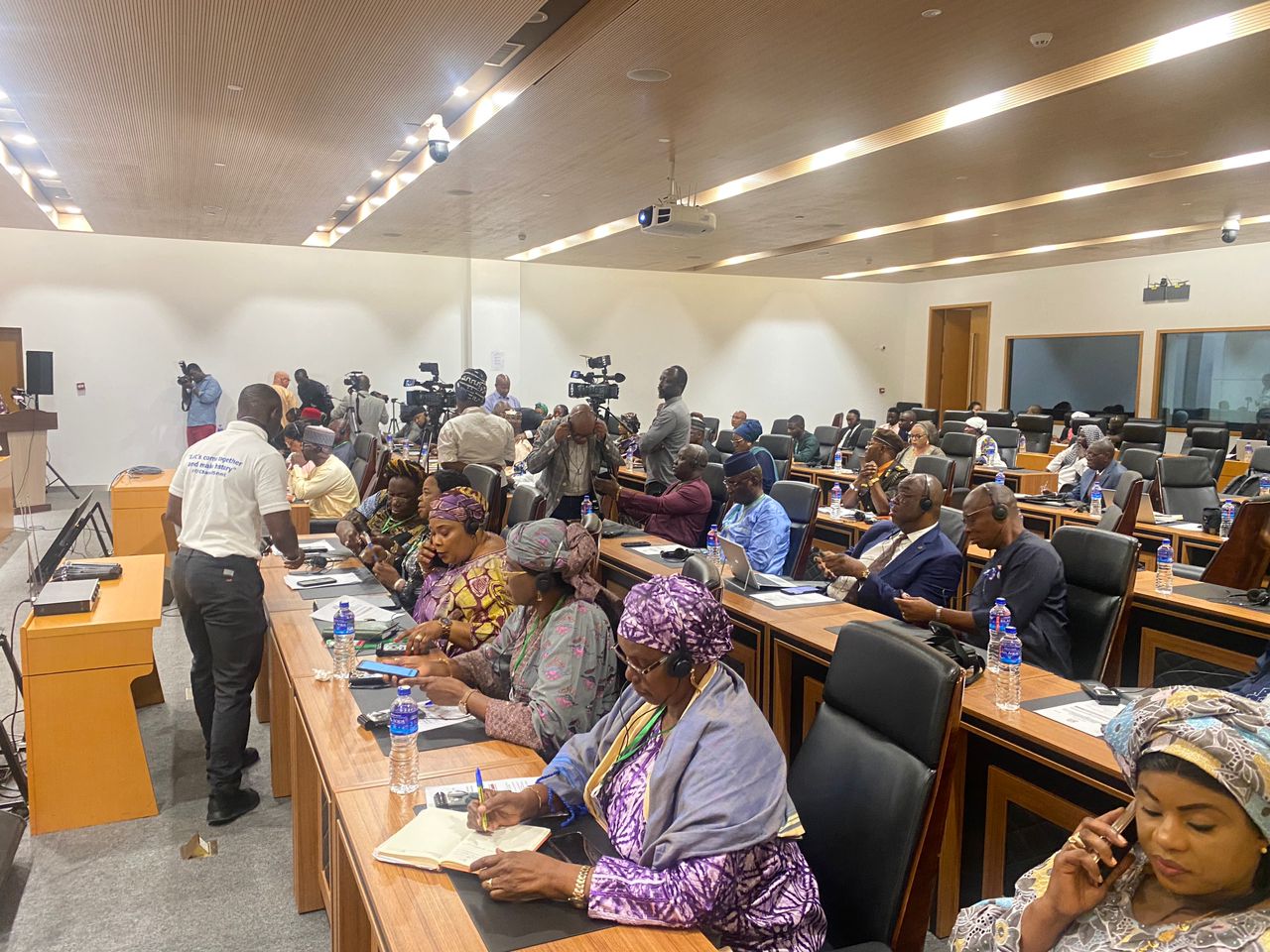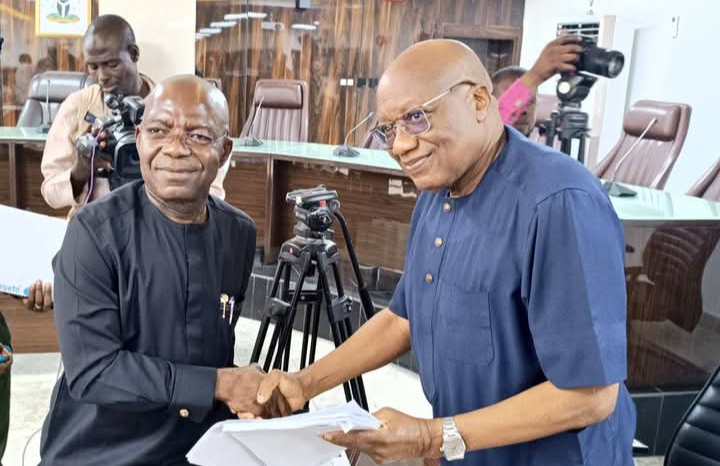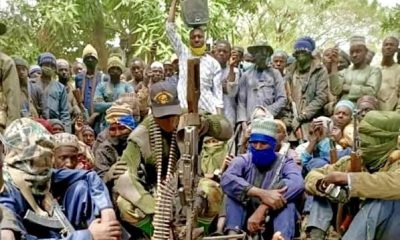News
ECOWAS Laws Should Facilitate, Not Hinder, Free Movement – Speaker Gambia Nat’l Assembly

By Gloria Ikibah
Speaker of the Gambia National Assembly, Hon. Fabakary Tombong Jatta, has reiterated that ECOWAS Laws must facilitate free movement of people across the sub-region borders rather than hinder it. Stating that free movement of persons, rights of residence and establishment are fundamental to the vision of a united peaceful and prosperous community
Speaker Jatta stated this at the ongoing delocalised meeting of the ECOWAS Parliament joint committees on Social Affairs, Gender and Women Empowerment/Legal Affairs and Human Rights, Political Affairs, Peace, Security and African Peer Review Mechanism (MAEP), Legal and Human Rights, Trade Customs and Free Movement on Monday in Banjul, The Gambia.
According to him, member states must ensure that their national laws are harmonized with regional commitments, provide robust oversight to guarantee compliance, and advocate tirelessly for the rights and welfare of all ECOWAS citizens.
He therefore challenged members of parliament to focus on resolutions that will allow member states harmonizing national laws with regional commitments and this he said, involves reviewing and amending immigration policies, labour laws, and other relevant legislation to align with the provisions of the protocol.
He said: “Our legislative actions must be geared towards creating an enabling environment where the protocol can thrive and deliver on its promises. Equally, we must also recognize the numerous challenges that have impeded the full realization of the protocol. Many of our citizens face significant difficulties when attempting to move across our borders. These challenges range from bureaucratic obstacles and inconsistent immigration policies to issues of national security.
“There is the urgent need to ensure that our laws facilitate, rather than hinder, the movement of people across our borders. Robust oversight on the part of the Parliamentarians is also essential to guarantee compliance with the protocol.
“We must hold our governments accountable for their commitments and ensure that they are implementing the necessary measures to facilitate free movement of our people across our region.
“The free movement of persons, right of residence, and establishment are fundamental to our vision of a united, peaceful, and prosperous Community. As parliamentarians, we have a crucial role to play in making this vision a reality.
“We must, therefore, approach our deliberations with a sense of urgency, commitment and determination, knowing that the hopes and aspirations of millions of ECOWAS citizens rest on our shoulders. Without any shred of doubt, I am confident that, together, we can overcome the challenges before us and pave the way for a more integrated, peaceful, and prosperous ECOWAS region.
“Many citizens encounter bureaucratic hurdles that impede their travel. Frequent changes in immigration rules, and a lack of clear information are common complaints. These barriers not only frustrate individuals but also undermine the spirit of regional integration. Security concerns present another significant challenge”.
The Minister of Foreign Affairs, International Cooperation and Gambians Abroad, Dr. Mamadou Tangara, who was represented by the Director of Africa Division, in the Ministry, Omar Balde, said free movement of the citizens provides for the right and establishes resources of living in essence.
The minister further disclosed that Gambia has strengthened structures and processes of its parliament in promoting greater public involvement and engagement with political processes, this he said was in line with regional objectives which is regional integration through trade and the movement of people, services and goods.
He stated: “The Gambia’s National Assembly through its several committees have established a series of interactive and public facing activities designed to drive accountability and inclusion while bringing the voices of citizens closer to parliamentarians including promoting integration through mobility, free movement and respect of the ECOWAS Protocol.
“The participation of the Gambia’s National Assembly Members in the ECOWAS Parliament is very promising in the implementation of the Protocol. Under the distinguished leadership of H.E. President Adama Barrow.
“The Gambia and its partners support the inclusion and participation of persons with disabilities, women and young people in political leadership and processes in the West African country by partnering actively with political parties and civil society organisations”.
He urged the Gambia National Assembly to pass legislation that would improve the implementation of migration policies and to harmonize various national laws related to migration.
In addition, the Minister of Trade, Industry, Regional Integration, and Employment of The Gambia, Baboucarr Joof, emphasized that the protocol on the free movement of persons, along with the rights of residence and establishment, is central to ECOWAS’s vision for a unified West African region.
According to the minister, this protocol represents the commitment of member states to create a borderless environment where individuals can travel, establish businesses, and reside freely across member states without undue restrictions. He highlighted that this vision not only supports economic growth and development but also enhances cultural and social integration among citizens.
He also noted that The Gambia is committed to its development plan for 2023-2027, which is aligned with the nation’s broader development goals.
“The government of the Gambia through my ministry has consistently demonstrated commitment to the implementation of ECOWAS brown cards for motor insurance. The ECOWAS biometric passport and identity cards with the potential to improve the free movement of persons, rights of residence and establishment in the Gambia.
“My ministry closely collaborates with the Gambia immigration department and ECOWAS brown card insurance bureau to sensitize and create awareness about the free movement protocol throughout the country every year.
“The parliament is not only relevant in making protocols but they are important in the implementation of the protocols as they are people’s representatives with much closer relationships with them.
“It is therefore crucial for parliament’s involvement in the implementation of the protocols and its supplement procols.to attend the objectives of this particular protocol”, Joof stated.
He encouraged the ECOWAS parliament to bolster its legislative efforts in transforming the objectives of the protocols into national laws. He emphasized the need for legislative bodies to work conscientiously to align national legislation with the provisions of the protocols. This alignment is crucial for supporting and facilitating the free movement of people, as well as the rights to residence and establishment.
“Regional integration is a product of collective and collaborative efforts that require close continuation among member States.
“There is a need for strong collaboration and coordination therefore in fostering dialogue and cooperation among national governments, regional institutions and other stakeholders’ to ensure guarantee, effective implementation strategies that address our needs.
“The full realisation of free movement in the ECOWAS area requires strong governance, based on mutual trust, shared responsibility and ownership of results”, the Minister said.
News
SAD! APC lawmaker dies while asleep

The lawmaker representing Kaura Namoda South Constituency in the Zamfara State House of Assembly, Aminu Ibrahim Kasuwar-Daji, has died.
It was gathered that the lawmaker passed on in his sleep during the early hours of Wednesday.
Aminu Ibrahim Kasuwar-Daji’s sudden death came as a shock to many in the state, especially his colleagues and political associates.
The All Progressives Congress (APC) in Zamfara, the party under which he was elected, expressed deep sorrow over his passage.
Members of the party, including the State Working Committee and other supporters, described his death as a great loss.
They said he was known for his dedication and honesty in serving his people.
His family, community members in Kaura Namoda South, and fellow lawmakers have been thrown into mourning as preparations for his burial began.
According to Islamic rites, he was buried today at 3:00 pm in his hometown of Kasuwar-Daji, located in the Kaura Namoda Local Government Area.
Many in the state have continued to express grief as they remember the role he played in representing the people and contributing to the work of the state assembly.
News
Just in: Sam Olumekun takes over as INEC’s Acting Chairman

Mr. Sam Olumekun has taken over at the Independent National Electoral Commission (INEC) as Acting Chairman.
Olumekun is INEC’s National Commissioner in charge of Information and Voter Education.
He performed his first duties today, receiving a high-level delegation of the Labour Party (LP) at the Commission’s headquarters in Abuja with other National Commissioners in attendance.
The delegation was led by Abia State Governor Dr. Alex Otti, who visited the Commission to discuss key developments within the Labour Party.
It was gathered that both parties engaged in discussions centered on enhancing collaboration and reinforcing democratic values.
During the visit, Governor Otti formally presented a Certified True Copy of the recent Supreme Court judgment concerning the party’s leadership.
He noted that the meeting was aimed at fostering clarity, mutual understanding, and institutional alignment regarding the Labour Party’s current structure.
Mr. Olumekun, the Acting INEC Chairman, reaffirmed the Commission’s unwavering commitment to neutrality, transparency, and the rule of law in the discharge of its constitutional responsibilities.
Recall that a viral WhatsApp message had indicated that Prof. Mahmood was sacked by President Bola Tinubu and replaced with one Prof. Bashiru Olamilekan.
“INEC Chairman Prof. Mahmud Yakubu has been replaced with Prof. Bashiru Olamilekan by President Tinubu,” the message, which had no attribution, read. However, both INEC and the Presidency debunked the widespread report.
Yakubu, who is rounding off his second tenure in office, is expected to exit the system towards the end of this year.
The process of appointing an INEC chairman is the President nominating a candidate and forwarding his particulars to the Department of State Services (DSS) for profiling.
After such screening, the President, thereafter, takes the name to the National Council of State for its advisory review.
Based on the outcome, the President sends the name to the Senate for screening and confirmation.
News
Crude oil prices slide further, now selling below $57

Crude oil prices have dropped below $57, following a previous rate of $59.78.
This decline coincides with the imposition of tariffs on several countries by US President Donald Trump.
A report from West Texas Intermediate attributes this price slump to consistent 6% reductions observed last week.
JPMorgan Chase & Co has warned that these tariffs could likely push both the US and global economies into a recession this year.
The financial institution explained that the tariffs, set to take effect this week, are expected to have widespread economic repercussions.
Market analysts and the business community have expressed concerns about the negative implications of these measures, predicting a slowdown in economic activities and a subsequent decline in oil demand.
-

 News21 hours ago
News21 hours agoOERAF held memorial lecture on conflict resolution, security/safety of community in Nigeria
-

 News7 hours ago
News7 hours agoUS revokes more than 500 foreign student visas
-

 News6 hours ago
News6 hours agoBanditry:” I was chained for 32days while in their den, killed my wife as I watch-Nat’l Assembly DD narrates experience
-

 News21 hours ago
News21 hours agoHoR Minority Caucus decries killings in Plateau, Benue states, urges immediate presidential decisive actions
-

 News8 hours ago
News8 hours agoIbas picks administrators for 23 Rivers LGs(SEE list)
-

 News13 hours ago
News13 hours agoBandits have seized control of 64 communities in Plateau – Gov Muftwang
-

 Economy13 hours ago
Economy13 hours agoMobile Money transactions hit $1.68trn in one year
-

 News13 hours ago
News13 hours agoAir Peace unveils new process for boarding passengers





